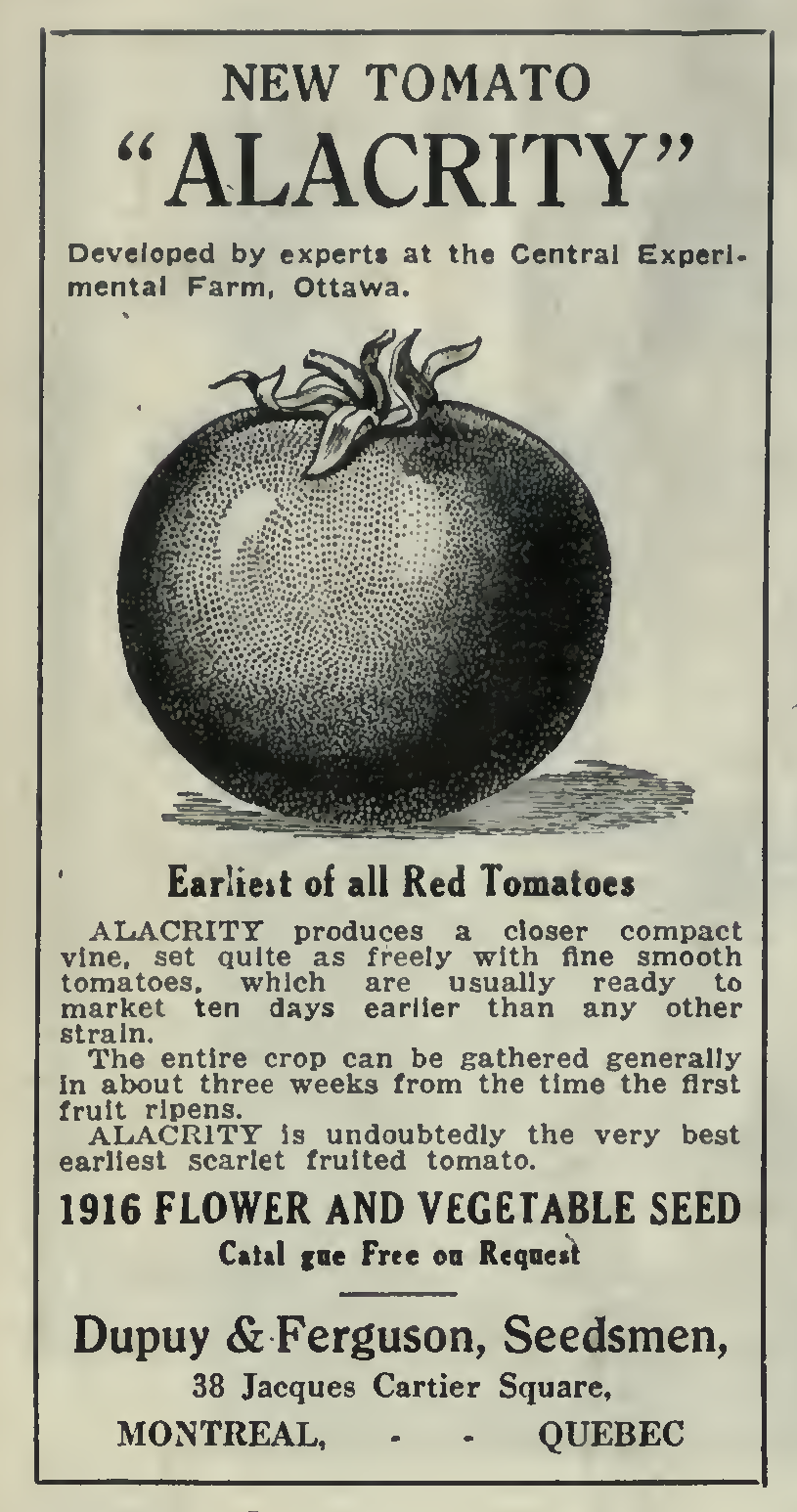The 100-Year-Old Tomato - Alacrity

From Seeds of Diversity magazine
Other shorter-season varieties were becoming available at about the same time, but none as ideal as Alacrity. Earliana had become widely popular by 1916, and some lesser known but intriguingly named varieties such as “First of All” and “Earliest and Best” were listed in seed catalogues of the early 1900s. What made Alacrity important was that it was bred and introduced in Canada, by a Canadian plant breeder. It was the first truly Canadian tomato variety, developed specifically for our growers.
According to Dan McMurray, who grew and compared many of our favourite Canadian tomatoes, Alacrity are typically 4 to 8 ounces with round, red fruit that ripen in 60-70 days. Different growers have found variances in the days to maturity, possibly because of their growing conditions. But regardless, this would have been very early for a medium-sized tomato in 1916, at least a week earlier than comparable varieties.
Early ripening was a key priority at the Dominion Experimental Farm in Ottawa, where Alacrity was developed. Later known as the Central Experimental Farm, the facility was created in 1886 to promote research into Canadian agriculture by the federal government. Much of the work done there, and at other government research stations, was to introduce varieties that would produce reliably in Canada's harsh growing conditions. In those early days, this was literally the key to opening up northern and western land for settlement.
Sir William Saunders, the first director of the Dominion Experimental Farm, made history with important introductions such as Marquis wheat. He assembled a team of scientists, plant and animal breeders, and horticulturists, and put them to work in a wide variety of projects. One of his early assistants, William T. Macoun, would become one of Canada's most famous horticulturists, and the hero of this story.
Macoun's work is impossible to summarize in a short article. His name appears on countless publications, scientific papers, popular magazine articles, and prizes in horticultural science. He worked mainly on apples, and many of his varieties such as Melba and Lobo are still known today, but he also worked on projects as diverse as the development of short-season sweet corn, and the control of potato blight and asparagus rust disease.
Around 1900, Macoun began a project to develop improved selections of tomatoes that would ripen early enough to be grown reliably in the short-season areas of Canada where Marquis wheat had become a mainstay. Up to that time, the laws of genetics had not yet been widely understood, so early plant breeding was done by intuition, trial and error, and a large amount of luck. The American seedsman and breeder Alexander Livingston is often credited with making tomatoes popular in the late 1800s, and his progressive philosophies of plant breeding had created many varieties that are still well known today, including Livingston's Beauty, Golden Queen, and Acme. Among his popular varieties was a reliable, round, red tomato called Stone, introduced in 1889.
Stone was fairly widely grown in the north-east U.S., and many selections were made from it, including an excellent, extra-early tomato discovered by a farmer named George Sparks. Sparks saved the seeds of his eariest-ripening “Stone” tomatoes, and eventually sold his own variety which he called “Sparks' Earliana” (today often known simply as Earliana). Since it ripened nearly a week earlier than Stone, Earliana became very popular, but W. T. Macoun thought he could improve it further.
After a decade of selection, Macoun had an excellent candidate. By 1915 he had given it the name “Alacrity”. It was offered directly to farmers at first, perhaps spurred by the urgency of the First World War, through Canada's fledgling network of agricultural experiment stations, and by 1916 it had appeared as a new commercial variety offered by the seed companies of the day.
Our first known commercial announcement of Alacrity is an advertisement in the Canadian Horticulturist magazine of 1916, exactly 100 years ago. For the first time, Canada had a tomato variety that it could call its own!
Seed Sources
Although it was very well known during the first half of the 20th century, Alacrity is hard to find now. Hundreds more Canadian introductions have followed in its footsteps, providing quality, flavour, and early ripeness. But Alacrity is still a good tomato. Give it a try, and celebrate a century of Canadian tomatoes in your garden this year!
Sources we know of: Prairie Garden Seeds, Gretas Organic Gardens
References
Jim Ternier, Prairie Garden Seeds
Tatiana Kouchnareva, Tatiana`s TomatoBase
The Canadian Horticulturalist 39.3, Peterboro, Ontario, 1916
Essays on the Early History of Plant Pathology and Mycology in Canada, Ralph H. Estey, McGill-Queens University Press, 1994
Ornamental Garden to Commemorate Life and Work of Dr. W.T. Macoun, Ottawa Citizen, May 30, 1936
Sparks' Earliana, Salem County Historical Society, 2012.
Canadian-Bred Tomatoes, Christene Rafuse, Heritage Seed Program (Seeds of Diversity) magazine, August 1990.
Not yet a member?
An annual membership to Seeds of Diversity gives you access to our seed exchange, seed grow-out programs, and our online news.

We depend on donations to do our work.

Thank you for your support!
